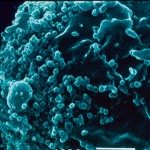Link to Pubmed [PMID] – 16359728
Placenta 2006 Sep-Oct;27(9-10):989-95
Mechanisms of HIV-1 in utero mother-to-child transmission (MTCT) protection provided by AZT are not completely understood. The placental cytokine network is involved in the control of HIV-1 in utero transmission but the effect of AZT on this network is unknown. To evaluate the effects of AZT on placental cytokine expression, the chorionic villi from HIV-1 uninfected women term placentae were cultured with 0, 100, and 2,000 ng/ml AZT. Tissue fragments were harvested at days 1, 4, and 7 to determine the level of cytokine mRNA by real-time RT-PCR. The viability and morphology of the placental histocultures were monitored by the expression of beta-human chorionic gonadotropin (beta-hCG) gene, lipopolysaccharide (LPS) activation, and microscopic examination. AZT at 2,000 ng/ml significantly down-regulated TNF-alpha mRNA expression at day 1 and day 4, but had no effect on beta-hCG, stromal cell-derived factor 1 (SDF-1), and IL-10 gene expression. AZT did not induce any deleterious impact on placental tissue structure. Furthermore, activation of chorionic villi by LPS for 24 h up-regulated IL-10 and TNF-alpha mRNA expression. Down-regulation of TNF-alpha mRNA could represent a mechanism through which AZT can decrease the risk of HIV-1 MTCT, in addition to its direct effect on HIV-1 replication.

